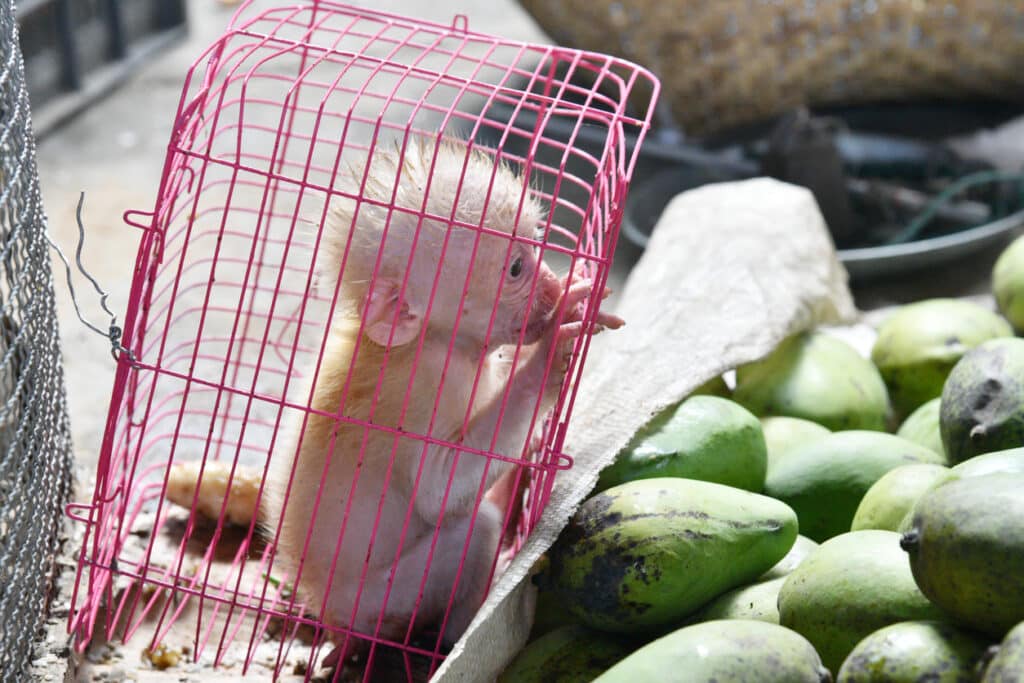Black bear paws. Pangolin leather boots. Elephant foot stools. Big cat skulls. Endangered live reptiles and birds. While this may sound like the prop list from a fantasy or science fiction film, the reality is that these items can be found and purchased through an internet search and a couple of clicks.
Over the past 17 years, the International Fund for Animal Welfare’s (IFAW) research has uncovered a growing online trade in live wildlife and wildlife products, with tens of thousands of online advertisements and posts identified across platforms and across continents offering imperiled animals for sale. Research findings have been used to sound the alarm about this ever-expanding, ecologically devastating stream of commerce. We’ve collaborated with governments, communities, enforcement entities, academics and corporations to identify and implement solutions. Much work has been done, but significant national and international action is needed to effectively disrupt wildlife cybercrime long-term.
In the international policy arena, the past few years have met with a number of successes. The Convention on International Trade in Endangered Species of Wild Fauna and Flora (CITES) adopted and amended a Resolution and a new Decision to tackle wildlife crime linked to the internet. In late 2020, members of the International Union for Conservation of Nature (IUCN) adopted with nearly 100% support a motion to combat sale of illegal wildlife products online, including language that recognized the important role that whistleblowers play in these efforts. IFAW has also brought this issue to the attention of the United Nations World Crime Congress, the G7, the First High Level Conference of the Americas on Illegal Wildlife Trade and many other forums.
Just last week, the United States Congress started to take note of online wildlife trafficking. The House Natural Resources Subcommittee on Waters, Oceans, and Wildlife held a hearing titled “Wildlife Trafficking and the Growing Online Marketplace”. While there isn’t specific legislation currently under consideration, the Subcommittee’s willingness to learn about and elevate this issue is a strong signal that there is political will to address it.
The United States is not only a consumer, but also a supplier of the species that are impacted by this illicit trade. As Congressman Darren Soto (Florida 9th District) noted, a massive international trafficking ring for flying squirrels—responsible for the capture of more than 3,600 animals— had been operating in Florida. At the end of 2020, charges were filed against a number of individuals who had been involved in this elaborate trafficking scheme to capture the animals, transport them across state lines, and illegally export them to buyers in Asia for the pet trade. There are also reports of a thriving trade in native songbirds for pets and singing competitions with wild birds being caught from forests primarily in Florida. As wild bear populations around the globe decline, American black bears are increasingly targeted for their gall bladders and paws. Native turtle species are taken from the wild by the thousands to fuel a pet trade that shifts to new species as others are depleted.
Combating wildlife trafficking, which often falls to resource-strapped law enforcement and wildlife agencies, is a massive undertaking in the physical world. Introduce the virtual online world and the task seems almost insurmountable. The internet provides wildlife traffickers with access to a vast international marketplace—one without borders that is subject to minimal oversight and is open 24 hours per day, 365 days per year. This structure offers many advantages to traffickers, including an expansive range of consumers. As with any enterprise, a virtual platform allows the product’s accessibility to transcend geographical limitations. People who would not have otherwise been able to acquire illicit wildlife without great effort are now able to do so with ease, which drives up demand. Greater connectivity also creates opportunities for new markets to emerge, particularly for pet and collector markets, where niche collectors become aware of new species.
Ending illegal wildlife trade will take a significant and sustained commitment from governments around the globe. Yet, we must also remember the impact that individuals—citizens, consumers, employees—can have to curb illegal trade. Florida’s flying squirrel trafficking ring was brought down thanks to the information provided by a single anonymous tipster. That person not only helped to disrupt an organized crime ring, but also saved countless animals from the pain and suffering of being plucked from their native habitats and forced into cramped and inhumane conditions for illegal transport. Federal and state policies should ensure that this type of reporting is incentivized and protect whistleblowers who expose wildlife trafficking.
Even everyday citizens—those without specific access to information about wildlife trafficking—can help to end it. The fact is that illegal online wildlife trade happens on public, open-source platforms. Anyone can access it, which means that anyone can flag it. Most online platforms have a reporting mechanism that allows users to notify them of illegal or otherwise offensive activity. If you see suspicious activity—sales of wildlife products that direct buyers to direct messaging applications, sellers that ask buyers to name the species they desire, sellers with a large inventory of similar ivory products, to name a few—report it.
Governments, online platforms, and law enforcement will surely bear the load of combating illegal online wildlife trade, but the most valuable information to do that may very well come from individuals.
